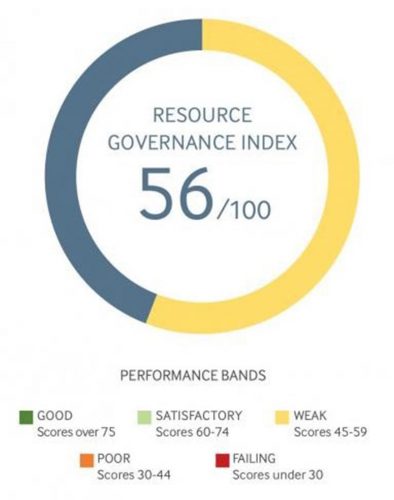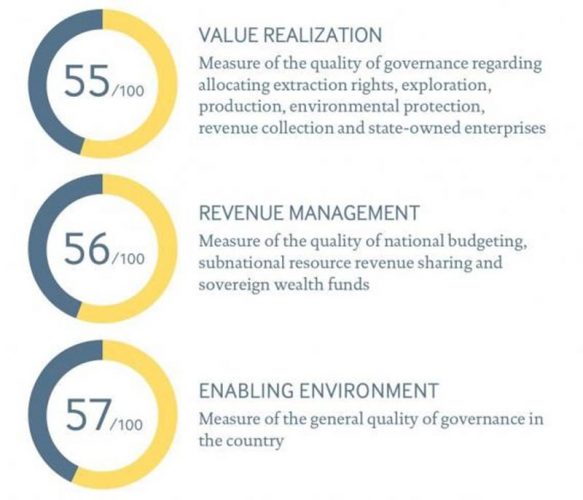Introduction
Today’s column wraps-up my highlighting of the role of governance of Guyana’s emerging oil and gas sector as an indicator of its prevailing condition. Readers should recall that this engagement with governance is the tenth and final such indicator that I have relied on, in order to draw a reliable appraisal of the prevailing state of Guyana’s emerging petroleum-driven economy. The column focuses on recent efforts to measure the state of governance. It spotlights the Natural Resource Governance Institute, NRGI, measurement of governance in Guyana and to a much lesser extent the efforts of the Extractive Industries Transparency Initiative, EITI.
Also, to recall briefly, the NRGI’s 2020-2025 Strategy Report considered a while ago in this series of columns, has bluntly declared its goal and aim is to assist Member countries 1) in getting good deals/revenues for their resources, and 2) in managing the resultant revenues for the benefit of its citizens inter-generationally; considering 3) the testing context of the global climate emergency, 4) evidence of pervasive state capture and 5) the corrosive widening and deepening of corruption.
The NRGI and EITI reported on governance in Guyana’s oil and gas sector last year.
NRGI Key Messages
The NRGI provides policy advice and options based on its National Resource Charter. It publishes an Index based on the Charter as an indicator of country attainment derived from a composite measure of: 1) Value Realization; 2) Revenue Management; and 3) Enabling Environment.
Key messages in its latest Guyana report are:
● The NRGI has posited that Guyana’s legal framework governing its licensing process raises concerns. Authorities have taken though, to disclose contracts, with negotiations and re-negotiations occurring behind closed doors.
● Fiscal rules governing public spending merit attention. These rules are overdue.
● Guyana’s enabling environment is also weak. Government effectiveness and regulatory quality are problematic, but commitment to open data standards is the most concerning indicator, with a “failing” score of just 12 points. The governance of the sector, both in terms of successful policymaking and public accountability, would benefit from an adherence to open data principles.
● On the positive side, government manages local impacts of the sector in line with best practices; environmental and social impact assessments are publicly available.
● The scoring is shown below
NRGI Key Recommendations
The major recommendations made by NRGI are;
The Ministry of Natural Resources should expedite the update of the Petroleum Act, aiming for the adoption and enforcement of competitive and transparent licensing processes to build public trust and strengthen accountability mechanisms.
2. The Ministry of Natural Resources should continue disclosing contracts and maintain an up-to-date registry of licences in line with EITI commitments.
3. The Ministry of Finance should lead a comprehensive redesign of Guyana’s fiscal framework and prioritize the adherence to a fiscal rule to prevent detrimental management of resource revenues.
4. The National Assembly, the Ministry of Natural Resources, the Guyana Energy Agency and the Ministry of Environment should prioritize a consultative discussion around Guyana’s oil and gas sector and its role in the energy transition, to adapt the institutional framework to the challenges of the changing global environment.
5. The National Assembly, the Ministry of Natural Resources and the Ministry of Finance should strengthen the Natural Resource Fund, to ensure transparent and accountable practices that contribute to successful revenue management. If the government decides to amend or repeal the related legislation, civil society actors and other stakeholders should be invited to actively participate in the process.
EITI
As previously indicated when I initially introduced discussion of the EITI in this series of columns, its primary task is to administer for its 55 Members [as of last year], a global standard for measuring the quality of governance along the value chain of extractive industries starting from the point of extraction to the generation and spending of their earned revenues by government in the economy. This ineluctably includes along the chain the allocation and registration of licenses, contracts, and regulations according to due processes
With an emphasis on data availability, reporting is done on an annual basis, based on the revised 2016 standard. In its validation reporting last year the Guyana EITI Board awarded Guyana a fairly low score for implementing the 2019 EITI Standard. That is, 52/100.
The ranking out of 100 is as follows: low= 0- 49; fairly low= 50- 69; moderate= 70- 84; high= 85- 92; very high= 93- 100.
There are three major components determining the overall score; namely, Outcome and Impacts; Stakeholder Management; and, Transparency. Their respective scores for Guyana were: 42/100; 60/100; and 53.5/100.
These components are calibrated from indicators and questionnaires, which are met or not along the scale: not met= o; partly met=- 30; mostly met= 60; fully met= 70; and exceeded= 100.
Conclusion
As I speculated in last week’s column, its governance is perhaps the most contentious topic under public discussion of Guyana’s oil and gas sector. NRGI and EITI reporting reveal two striking features. One is that Guyana is under-performing in its governance indicators based on global best practices. And, the other is that based on the date of its First Oil (December 2019) much has been accomplished in two and a half years in terms of resource acquisition, production, sales at remunerative prices, government revenues and spending, economic performance (exports, income, employment consumption, saving and investment).
Regulatory challenges, areas for improvement, persist because the oil and gas legal framework remains underdeveloped and inadequate for oversight along its value chain. Of great concern, public agencies governing the oil and gas sector receive their appropriations via the National Assembly and not directly from petroleum revenues.
Finally, I repeat an observation I made in last week’s conclusion: “In my view the greatest challenge seems to lie in the seemingly high-handed and dismissive attitude of the lead Contractor to the admittedly weak legal framework of the oil and gas sector as pure humbug!”








